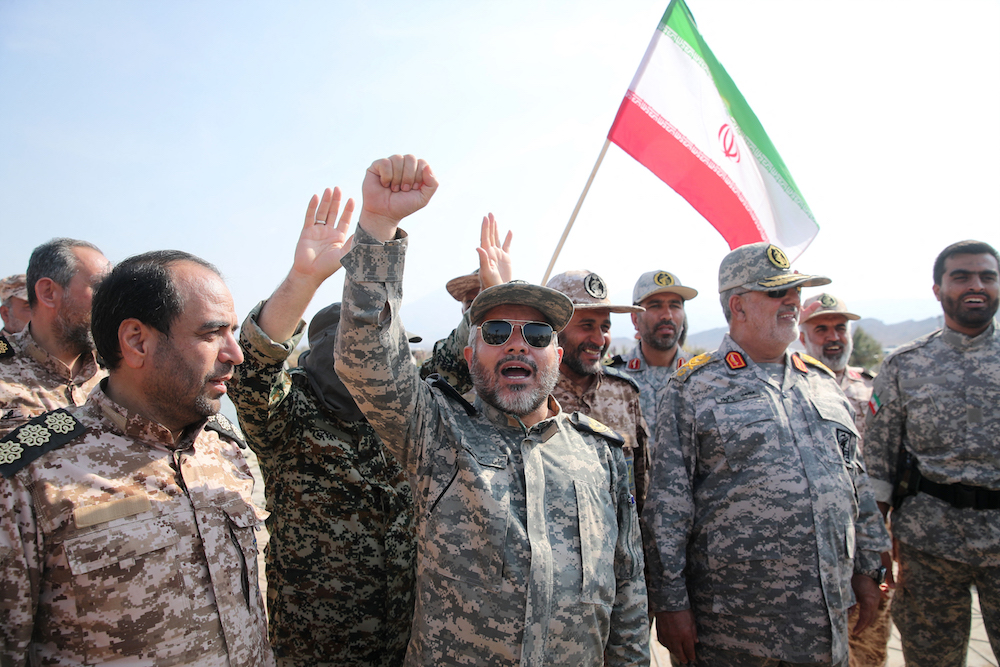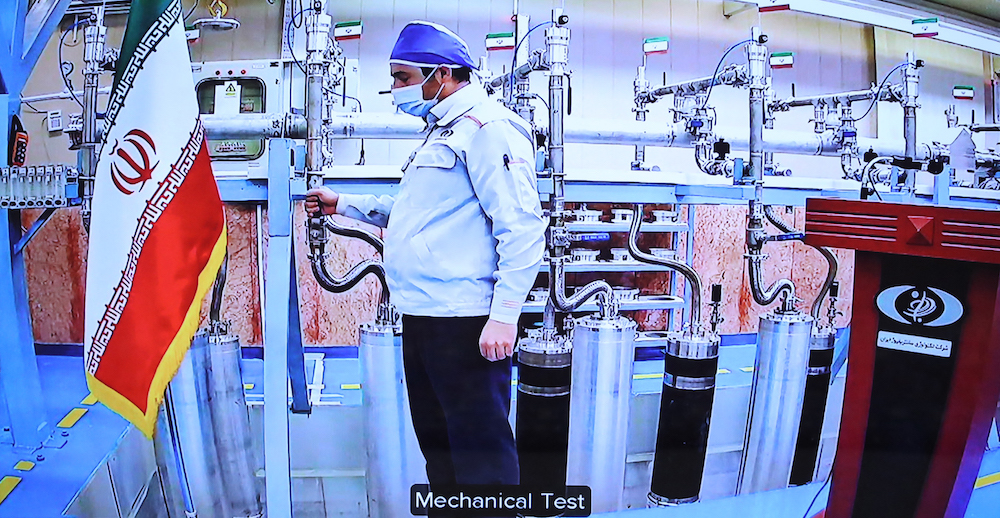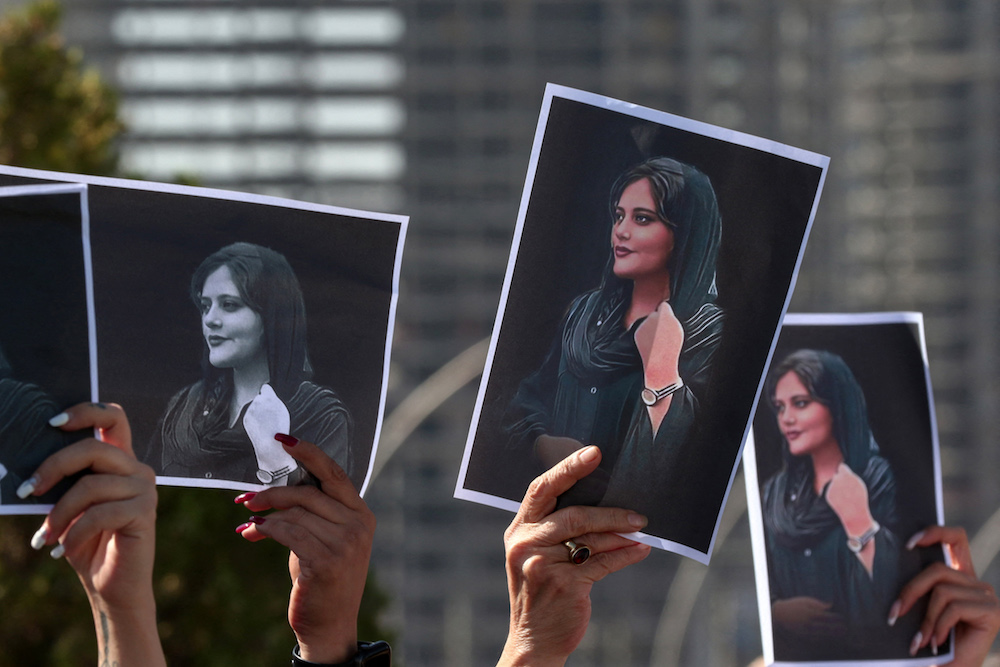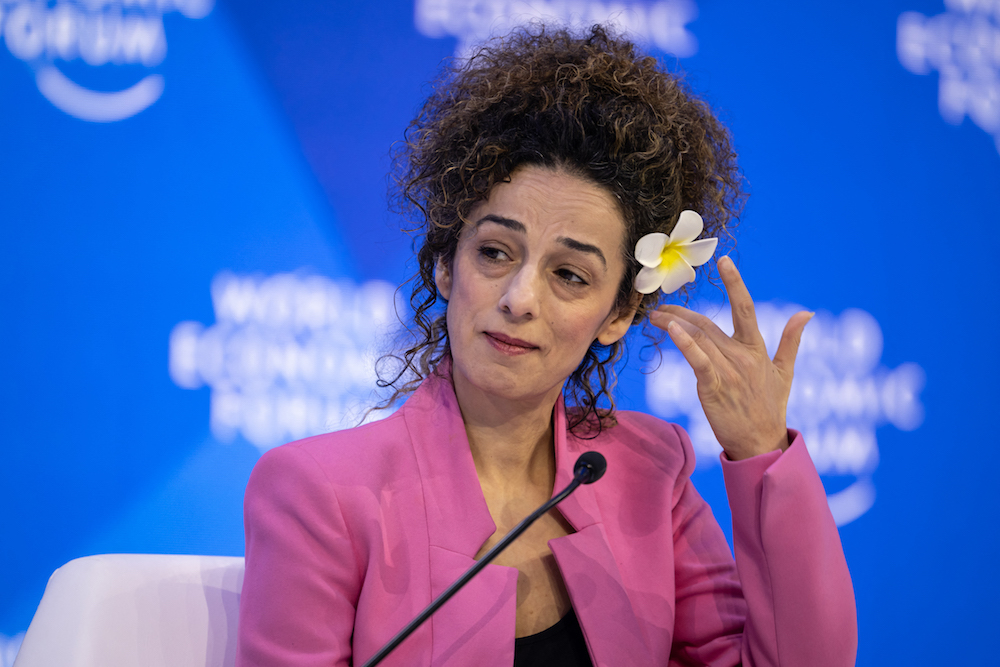
[ad_1]
World now has an alternative to the nuclear deal: ‘The people of Iran,’ former US National Security Adviser John Bolton tells Arab News
NEW YORK CITY: Ever since an Islamic Revolutionary Guard Corps operative tried to murder John Bolton in August 2022, the former US national security adviser and former ambassador to the UN has been under the protection of the Secret Service.
“It’s a different kind of life than walking around totally freely,” Bolton told Arab News in a wide-ranging exclusive interview. “But considering the alternative, I’m very grateful for the Secret Service protection.”
Known for his hawkish views on the Iranian regime and reputed to be a driving force behind former US President Donald Trump’s “maximum pressure” strategy, the assassination plot has, if anything, only intensified Bolton’s views.
“It’s one more small reason to want to see the regime replaced in Iran with a government that really reflects the will of the Iranian people,” he added.
Last summer, the US Department of Justice charged Iranian military operative Shahram Poursafi with plotting to assassinate Bolton, likely in retaliation for the Trump administration’s January 2020 drone strike that killed Qassem Soleimani, according to court documents.
Soleimani was the commander of the IRGC’s extraterritorial Quds Force — an elite unit tasked with exporting the Islamic revolution throughout the Middle East and beyond, using violence and subterfuge to further the regime’s objectives.
Around the same time of Poursafi’s arrest, novelist Salman Rushdie was stabbed multiple times as he was about to give a public lecture in New York City. The attack, if not directly linked to Iran, was at least incited by the regime’s 1989 fatwa against the writer.
Then, in late January this year, the Department of Justice charged three men for an alleged plot that originated from Iran to kill Iranian American journalist and human rights activist Masih Alinejad, who has been a vocal critic of the regime’s abuses.
Speaking to Arab News, Bolton described Iran’s threats against US officials and the regime’s overseas opponents as “unprecedented in recent times.

“(Those threats) demonstrate really the fundamentally terrorist nature of the regime itself, (and) why they can’t be trusted, whether it’s on the nuclear deal or anything else, to actually do what they commit to.”
This “fundamental character” of the Iranian regime is also evident “every day in the repression of the Iranian people and in the terrorist groups it backs in its region.”
Bolton believes there is too little awareness or acknowledgment of the regime’s campaign of targeted assassinations, which has become more audacious since the onset of nationwide anti-government protests in September.
“It really hasn’t sunk in that the government of Iran is systematically trying to eliminate vocal opposition to its policies,” he said.
Western leaders have hardened their rhetoric against Iran in recent months since the regime launched a harsh crackdown on anti-government protests.
Iranians have been taking to the streets since last September when 22-year-old Mahsa Amini died in the custody of Iran’s notorious morality police, sparking a wider movement against the theocracy’s treatment of women and the overall decline in living standards.
The US and several European governments have also criticized Tehran for supplying combat drones to the Russian military, which are reportedly being used against civilian facilities in Ukraine.
Reflecting a deterioration in the West’s already dire relations with Tehran in recent months, the US, UK and EU have imposed new sanctions on dozens of Iranian officials and organizations, including units of the IRGC.
Those sanctioned can no longer travel to the EU, while any assets they hold inside the EU can be frozen. Meanwhile, talks are ongoing in the European Parliament to determine whether or not to proscribe the IRGC as a terrorist organization.
Despite this, the Biden administration and its European allies are still trying to revive the 2015 Iran nuclear deal, also known as the Joint Comprehensive Plan of Action (JCPOA), with a view to offering Iran sanctions relief in return for the regime’s abandonment of its nuclear program.

Rafael Grossi, director general of the International Atomic Energy Agency, has called the nuclear deal “an empty shell,” under which “every limit that existed in the JCPOA has been violated several times.”
The Trump administration withdrew from the deal in 2018, arguing that it did not go far enough in containing the regime’s nuclear ambitions, nor its ballistic missile program and proxy militia activities throughout the region.
“It’s clear to me that the Biden administration still wants to get back into this deal,” Bolton told Arab News.
“They can say it’s not on the agenda, it’s in the deep freeze. But (as) we say in America, it’s not six feet under yet. It is still alive. And I think for many in the Biden administration, the resistance that we see in Iran today is inconvenient to their higher objective of getting back into the nuclear deal.”
Analysts say leaving the door open to diplomacy is not so much a reflection of the West’s hopes of a real breakthrough with Iran, but rather of the dilemma Western powers face as they run out of alternatives to containing Iran’s nuclear ambitions.
The preference now, it would appear, is to maintain the status quo, in which all sides agree implicitly that there is no deal, but also no crisis.
Although this is not an ideal scenario for Iran — with sanctions still in place and assets frozen — Bolton believes that the status quo benefits the Islamic Republic.

“Iranian exports of oil are at the highest level today since the reimposition of the sanctions in 2018 by the Trump administration after we withdrew from the nuclear deal. And there’s no penalty for Iran. They’re selling oil to China. (And) Iran is gaining revenue from the purchases of oil by China that it desperately needs,” he said.
“So (Iran) can live with the status quo for a long time while its nuclear weapons and ballistic missile programs continue to make progress, while it continues to sponsor terrorist groups in the region and terrorist attacks against its enemies around the world, and while it still tries to repress the resistance to the regime itself inside Iran.”
Iran is now enriching uranium at 60 percent purity — close to weapons grade. Western nations fear that the JCPOA is the only deterrent that remains to Iran actually building a nuclear weapon.
Bolton believes this logic is “fundamentally flawed.”
He said: “It’s the deal itself, not even Iran’s violations of the deal, but the deal itself that allows Iran a path to nuclear weapons.”
The “biggest mistake” that the US and others made in the lead-up to the 2015 accord, he says, was that they did not insist Iran make a clear, unequivocal decision to give up its pursuit of nuclear weapons.
“Exactly the opposite was the case. Iran reaffirmed to itself internally that it wanted nuclear weapons and it would use this deal to revive the economy, to provide more resources, not just for the weapons program, but for the missile program, for terrorism and other malign activities.”
Bolton’s Points
* Women’s revolution is an untenable situation for ayatollahs
* Iranian regime at its weakest since 1979 revolution
* The Biden administration is ‘not listening’ to the Arab side
* A fundamental mistake of JCPOA was excluding regional countries
Bolton believes another major flaw of the JCPOA was believing that it was possible to isolate the nuclear program from Iran’s support for international terrorism and its conventional military activities in the region.
“That was a mistake,” he said. “But an even more fundamental mistake was to negotiate with the ayatollahs, without countries in the region being at the table as well.
“The Biden administration criticized Trump for not taking our allies more into account by not being more inclusive in our foreign policy. And yet it’s still the Biden administration that won’t put the GCC countries or Israel or anybody else into the negotiations.
“These are the countries closest geographically to Iran, most vulnerable to the terrorist attacks and the threat of Iran’s ballistic missiles and to the nuclear (threat) as well.
“Saudi Arabia and the UAE have both been targets of Iranian drones and cruise missiles fired by the Houthi rebels in Yemen. (Iranians have) attacked civilian infrastructure like the oil industry. They’ve attacked civilian airports.
“Iran has supplied militia groups in Iraq with drones and mortars that have attacked American and other foreign positions, attacked Sunni locations, (and) really tried to destabilize the government. They’re assisting Hezbollah and Hamas.
“This is a regime that threatens everybody. And yet none of the countries that have borne the brunt of these terrorist activities has any say in the negotiation. So, I think, if there were a chance to negotiate with the ayatollahs, and I don’t think that would ever be successful, a good alliance leader should take account of the interests of all of its members.
“And I don’t think the Biden administration is listening to the Arab side of this equation.”

In an op-ed for The New York Times in 2015, Bolton wrote: “Had anyone believed President Obama’s mantra that ‘all options are on the table’ to deal with Iran’s nuclear weapons program, the Vienna agreement might have emerged less advantageously for Tehran. But no one took Mr. Obama’s threat of military force seriously — a credibility gap that … Iran still exploits. Even so, Vice President Joseph R. Biden Jr. is still trying to reassure nervous Democrats in Congress that the Vienna agreement does not preclude America’s use of force.”
Today, Bolton says the threat to use force is no longer necessary, because the alternative to the JCPOA lies in “the people of Iran.”
He said: “They’re out in the streets all over the country. And they’re not saying ‘Death to America’ anymore. They’re saying ‘Death to the Ayatollah Khamenei.’
“The regime is not kept in power anymore by support from the people. That’s all but disappeared. It now rules through the barrel of a gun. And I think the most likely way the regime will come down will be when the top military leadership splits.
“And I am confident that that is more likely to happen here because of the nature of the protests led by Iran’s women. In the Revolutionary Guard and the regular army, every one of those generals has a mother. They have sisters, wives and daughters. And they are all hearing the same thing at night every day.
“And I think it means they understand how intolerable their family and others think the regime is. That is a situation. It’s unsustainable for the ayatollahs.”

Bolton believes the Biden administration and its allies must do more to support the protest movement, “perhaps by providing communications equipment (so) that the people within Iran who support the resistance can communicate better.
“There’s really no central leadership to the resistance, which shows how widespread it is, how spontaneous it was. But better coordination would make them more powerfully situated in their opposition to the regime and also allow them to communicate with the diaspora outside Iran.
“And I think we can ask the opposition: What do they really need? Probably just resources, financial assistance, but perhaps other things as well. And I think we ought to try and get other countries around the world, and certainly countries in the region, but also countries from Europe and elsewhere, to come together to say this is a real opportunity to get a free Iran.
“You know, it’s not just a demonstration against the oppression of the women of Iran. This is really a direct assault on the legitimacy of the ideological foundations of the revolution itself. And when you add that to the economic discontent all over the country that’s been going on for many years now, I think the regime is in the weakest position it’s been since it took power in 1979.”
Bolton added: “So, if the rest of the world or certainly the US makes it clear that we support the people and we’re not going to forget the people, and that if there are things we can do to help them, we’re prepared to do it.
“If they split the Revolutionary Guard, split the military, and the regime comes down, that we will move quickly to bring them back into the international community, eliminate the sanctions, allow foreign investment to resuscitate the oil industry in Iran, and assist them in dismantling the nuclear weapons program, as we did in the case of Libya, and take it out of the country, to provide, really, for better safety for the Iranians.”
[ad_2]


